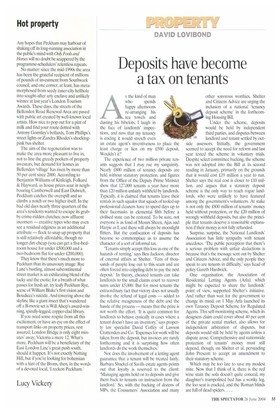Deposits have become a tax on tenants
s the kind of man who spends happy afternoons re-arranging his tea towels and dusting his bibelots, I laugh in the face of landlords' inspections, and now that my tenancy is ending it would stretch even an estate agent's inventiveness to place the least charge or lien on my £500 deposit. Wouldn't it?
The experience of two million private tenants suggests that I may rue my sanguinity, Nearly £800 million of tenancy deposits are held without statutory protection, and figures from the Office of the Deputy Prime Minister show that 127,000 tenants a year have more than £20 million unfairly withheld by landlords. Typically, it is claimed that tenants leave their rentals in such squalor that squads of tooled-up professional cleaners have to spend days up to their facemasks in elemental filth before a civilised state can be restored. To be sure, not everyone is as fond of Messrs Sheen, Ajax and Harpic as I. and there will always be moonlight flitters. But the confiscation of deposits has become so commonplace as to assume the character of a sort of informal tax.
'Tenants simply accept this loss as one of the hazards of renting,' says Ben Jackson, director of external affairs at Shelter. 'Tens of thousands of people lose out to this scam and are often forced into crippling debt to pay the next deposit.' In theory, cheated tenants can take landlords to the small claims court to recover sums under £5,000. But for most tenants the extraordinary fact that victory does not usually involve the refund of legal costs — added to the relative meagreness of the debt and the hassle of the process — means that the prize is not worth the effort. `It is quite common for landlords to behave cynically in cases where a tenant doesn't have an inventory,' says property law specialist David Coffey of Lawson Cruttenden and Co. 'Expenses for work will be taken from the deposit, but invoices are rarely forthcoming and it is surprising how often landlords do the work themselves.'
Nor does the involvement of a letting agent guarantee that a tenant will be treated fairly. Barbara Shackel of Savills estate agents points out that loyalty is reserved to the client: 'Managing agents hold on to deposits and give them back to tenants on instruction from the landlord.' So, with the backing of dozens of MPs, the Consumers' Association and many other sonorous worthies, Shelter and Citizens Advice are urging the inclusion of a national 'tenancy deposit scheme' in the forthcoming Housing Bill.
Under the scheme, deposits would be held by independent third parties, and disputes between 7 landlord and tenant settled by outside assessors. Initially, the government seemed to accept the need for reform and last year tested the scheme in voluntary trials. Despite select committee backing, the scheme was not adopted into the Bill at its second reading in January, primarily on the grounds that it would cost £19 million a year to run. Shelter says the real cost is closer to £10 million, and argues that a statutory deposit scheme is the only way to reach rogue landlords, who were unlikely to have featured among the government's volunteers. At stake is not only the BOO million of tenants' money held without protection, or the £20 million of wrongly withheld deposits, but also the principle that tenants deserve a reasonable explanation if their money is not fully refunded.
Surprise, surprise, the National Landlords' Association has little sympathy with tenant anecdotes. 'The public perception that there's a serious problem with unfair deductions is because that's the message sent out by Shelter and Citizens Advice, and the only people they speak to are tenants in difficulty,' says head of policy Gareth Hardwick.
One organisation, the Association of Residential Letting Agents (Arta), which might be expected to share the landlords' point of view, supported Shelter's initiative. And rather than wait for the government to change its mind, on 1 May Aria launched its own Tenancy Deposit Scheme for Regulated Agents. This self-monitoring scheme, which its designers claim could cover about 40 per cent of the private rental market, also allows for independent arbitration of disputes, but deposits would still be held by agents unless a dispute arose. Comprehensive and nationwide protection of tenants' money must still depend, though, on Shelter et al. persuading John Prescott to accept an amendment to their statutory scheme.
Which may be too late to save my modest mite. Now that I think of it, there is the red wine stain the sofa doesn't quite conceal, my daughter's trampolined bed has a wonky leg, the loo seat is cracked, and the Roman blinds are full of dead spiders. . . .


































































 Previous page
Previous page